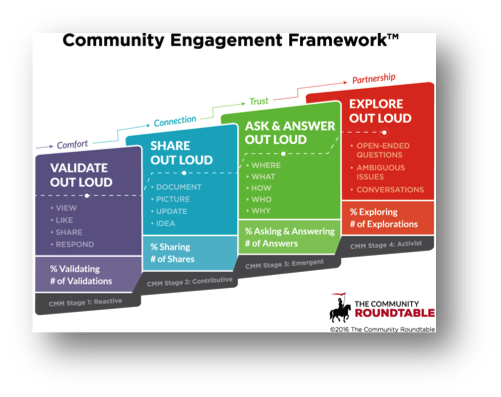The Work Out Loud framework is now the Community Engagement framework. Same great ideas, new community-focused title
By Rachel Happe, Co-Founder & Principal, The Community Roundtable
This week is ‘International Working Out Loud Week‘ or #wolweek – a week to highlight the growing practice of creating better organizations by sharing not just our work products, but our work processes. It’s fitting that this year #wolweek coincides with the release of John Stepper’s new book – Working Out Loud: For a better career and life, as John has been instrumental in applying the concept and documenting both how to do it well and its value.
At The Community Roundtable, where we focus on how to create healthy and productive communities, we see working out loud as a key behavior community managers can encourage and reward to establish connections and build trusting relationships. Depending on the context, working out loud can either be relatively easy to establish or it can be incredibly complex.
So what kinds of things make working out loud challenging?
- No appreciation of why working out loud is valuable
- Critical cultures
- Cultures where knowledge is protected because it is the primary currency of power
- Individuals’ perspectives and agency
- Poor online communication skills
- Lack of understanding of how to work out loud
Taken together, those barriers can be significant, especially inside organizations, and simply modeling behavior often isn’t enough. Because of that, we have deconstructed working out loud into four categories:
- Validate Out Loud
- Share Out loud
- Ask & Answer Out Loud
- Explore Out Loud
We believe that each of these pieces of working out loud is important to focus on independently because they incrementally create a more collaborative environment. Too often, community managers and their stakeholders try to jump straight to robust exchanges before a new or immature community might be ready for it. The Community Roundtable’s Community Engagement Framework gives structure to the process and provides community managers with the goals and metrics they should focus on as their communities evolve.

In each step, there are community management techniques to trigger, establish and reward the behaviors. For example, Sharing Out Loud can be triggered by having a regular thread where people share their priories for the week, like we do in TheCR Network. That helps community members understand the social environment, get comfortable with how people respond to each other and engage without fear of demonstrating a lack of knowledge – making the community a comfortable place for members to share.
Once created, the sense of comfort in the community makes it easier for members to ask other questions without fear of criticism or judgment, and those questions are typically effective social triggers for getting responses – and with them, hopefully, solutions. By measuring how the community is behaving in each of these areas, community managers can get a good sense of how programming should be prioritized and how much value is being generated.
Download the Community Engagement Framework here.
Looking for more ideas about how to generate community value? Join TheCR Network or contact us.
